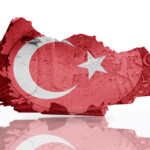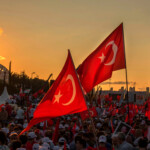‘The wider failure of public intellectuals is twofold: first, raising the expectations of people who looked up to their analysis and were utterly demoralized by the election outcomes. Second is their hand-wringing — they have shrugged off any responsibility for how their analysis was short-sighted.’
The sources of Recep Tayyip Erdoğan’s power are vast. In his over twenty years of rule, he has consolidated power to build himself a loyal bureaucratic system (including the military and law enforcement), a compliant mainstream media landscape, and a government system that positions his dictates above any notion of oversight. Added to this is the lack of a credible political opposition field that could offer voters a credible alternative to Erdoğan.
This much is known and well-documented. Therefore, when curious observers ask, “Why did Erdoğan win the 2023 presidential elections?” The answer is usually conveyed in a mixture of the reasons cited above. Meanwhile, the elephant in the room — namely, the country’s opposition intelligentsia — is left unaddressed.
Turkey’s intelligentsia is broad and diverse. But the most recent general elections also showed its demoralizing effect on public opinion. Ahead of and during the general elections held in Turkey in May 2023, many of the influential opposition media outlets, with their commentators and journalists, were in a state of euphoria. Many respected analysts abandoned their objective analytical toolkits and lenses to cheer for the main opposition candidate who ran against Erdoğan: Kemal Kılıçdaroğlu. Kılıçdaroğlu’s candidacy was essentially forced upon the public by Kılıçdaroğlu himself and his narrow group of political operators, with little debate, public input, let alone any analysis to determine whether he was indeed the best candidate to defeat Erdoğan in what many described as the country’s most crucial election.
Instead, the opposition intelligentsia helped to cement a widespread view that Kılıçdaroğlu was the man to defeat Erdoğan. Meanwhile, those who questioned this decision were cast out as pariahs who could not read the writing on the wall. Seasoned analysts would engage in targeted campaigns that declared that the Erdoğan era was finished and he had no chance of surviving reelection.
This certainty was based on what Rusen Cakir, the editor of Medyascope, constantly referred to as a “governance crisis” by Erdoğan. This “governance crisis” was based on the premise that Erdoğan failed to deliver meaningful solutions to the most pressing economic and political problems the country and voters were facing. Cakir was not alone in this message. Other veteran analysts and observers would join his weekly broadcasts, assuming that their conversations with ordinary voters and attendance at his Republican People’s Party (CHP) campaign rallies were clear signs the Erdoğan era was at its near end.
One veteran journalist and Kılıçdaroğlu advocate, Kadri Gursel, went as far as to say that those who could not see the coming tidal wave were not only uninformed but might not really want Erdoğan out of office! Similar commentaries paid scant attention to alternative analyses: namely that Erdoğan’s image may be tarnished, but he had significant structural advantages arising from incumbency (outlined in the first paragraph) that may help him stay in power.
In the end, the skeptics got it right. What is troubling is that, while the predictions of journalists, pollsters, and analysts can be wrong, it was the marginalizing tone and the refusal to take critical analyses that presented credible alternative scenarios to the public into account.
Almost three months since the election, these pundits, rather than acknowledging that they misled the public, have only accepted that they were wrong and that it was time to move on and remain optimistic.
The wider failure of public intellectuals is twofold: first, raising the expectations of people who looked up to their analysis and were utterly demoralized by the election outcomes. Second is their hand-wringing — they have shrugged off any responsibility for how their analysis was short-sighted.
Analysts have a duty to the Turkish public they influence by providing all the information they are entitled to. Of course, their analyses can be proven wrong, in part or in whole. What would have been valuable in this election cycle was for respected and popular independent outlets to focus on a variety of electoral outcome scenarios, a critical look at why the Kılıçdaroğlu campaign and candidacy were lackluster, and a keener focus on the existing strengths of Erdoğan’s state apparatus that prevented a genuinely competitive election.
Instead, we got a misinformation behemoth wherein the vast majority of Turkey’s pro-Erdoğan media spread misinformation, seemingly joined by opposition media outlets that willfully misrepresented the range of possible outcomes that could come to bear. Both helped serve Erdoğan’s interests. However, only the latter is responsible for the sense of demoralization, apathy, and public anger that has since ensued. The Turkish public deserves better from those who claim to speak truth to power.
This article was originally published by Global Voices.
The views and opinions expressed above are the author’s and do not represent those of the Free Turkish Press.


